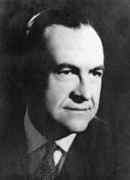Person: Varga, Ottó

Ottó Varga was a Hungarian mathematician who worked in differential geometry.
Mathematical Profile (Excerpt):
- At first Imre Varga was a Lutheran minister in a church in Poprád but later became archdeacon of Szepes County.
- Ottó began his schooling in Poprád where he attended the local Hungarian primary school.
- Teaching at this school was in German and quickly Ottó spoke both Czech and German as a native speaker.
- In addition to being the director of the school, Bruckner taught mathematics and it was his teaching that inspired Varga.
- His abilities meant that, while at the Gymnasium, Varga's teacher asked him to help by teaching the less able students.
- When Varga began to study this book he realised that, although he had been doing well in mathematics at school, he actually knew very little mathematics.
- Varga, therefore, entered the Faculty of Architecture at the Technical University of Vienna in 1927.
- Certainly there was some descriptive geometry taught in the architecture course, which Varga loved, but there was not nearly enough mathematics to keep him happy.
- He soon realised that Varga had a special talent for geometry and began to advise him on topics in differential geometry; Varga began to undertake research.
- Berwald then advised Varga to continue his studies in Hamburg where Wilhelm Blaschke headed a world-famous school of geometry.
- Varga spent the academic year 1934-35 at Hamburg.
- Varga published a joint paper with Blaschke, namely Integralgeometrie 9.
- In February 1937, now working as Berwald's assistant in Prague, Varga and Berwald submitted the joint paper Integralgeometrie 24.
- In 1938 Varga spoke at the meeting of the meeting of the Deutscher Physiker und Mathematikertag in Baden-Baden.
- Varga replied that he had already sent it elsewhere.
- Many weeks later Varga received his manuscript back "with the dry remark" that in Hamburg similar results were already known.
- Then Blaschke published the same result, even using Varga's notation.
- Varga's paper appeared in an obscure journal published in Pressburg (modern Bratislava) with a footnote referring to his Baden-Baden lecture.
- Not only did Blaschke not cite Varga, but the two publications are said to be virtually identical.
- Varga naturally complained - but this only earned him Blaschke's dislike (and, after all he was only a Prague Privatdocent, whereas Blaschke was an internationally known Hamburg professor).
- In fact, when Kowalewski enthusiastically recommended Varga for a position in Braunschweig, and Kowalewski heard of it, he apparently remarked to the Braunschweig authorities that "he did not know whether Varga stood 100% in agreement with the new state" - enough to prevent Varga from getting the position.
- Blaschke tried (unsuccessfully) to prevent Varga from advancing academically within Germany itself, as he pressured Varga to accept a job in Pressburg, a suggestion Kowalewski called "rather shabby." It was after this last, in early December 1940, that Kowalewski wrote to Bieberbach - writing earlier seems to have been delayed by illness.
- Now this German invasion had given Varga a severe problem.
- With his position in Prague falling apart, Varga decided to return to Hungary in 1941.
- Varga was promoted to extraordinary professor at Debrecen in 1947 and an ordinary professor in the following year.
- Varga had met Jolán Pukánszky in Debrecen in 1945.
- At Debrecen Varga was dean of Faculty of Science (1949-1950) and then Head of the Department of Mathematics (1950-1959).
- Varga finished his first work at the time of the publication of the 'Comptes Rendus' article.
- Varga introduced and studied in his work the concept of an affine connection and its curvatures in the line element manifold of a Finsler space.
- A few years later Varga resumed the theme, and gave an elegant, geometrical construction for the metrical parallel translation, and thus for the metrical linear connection in Finsler spaces.
- In Hungary Ottó Varga was the leading scientist in differential geometry and he became the founder of the Debrecen School of Differential Geometry.
- However Varga did not spend the rest of his career in Debrecen.
- Varga was made head of the differential geometry research group in the Hungarian Academy of Sciences in 1958, an ordinary member of the Academy in 1965 and, in 1967, he was made a senior researcher at the Academy's Mathematical Institute.
- Among the honours Varga received, we mention the Gyula König Medal in 1944 from the Mathematical and Physical Society (since 1947 the János Bolyai Mathematical Society), and the Kossuth Prize from the Hungarian Academy of Sciences (1952).
Born 22 November 1909, Szepetnek, Hungary. Died 14 June 1969, Budapest, Hungary.
View full biography at MacTutor
Tags relevant for this person:
Origin Hungary
Thank you to the contributors under CC BY-SA 4.0! 

- Github:
-

- non-Github:
- @J-J-O'Connor
- @E-F-Robertson
References
Adapted from other CC BY-SA 4.0 Sources:
- O’Connor, John J; Robertson, Edmund F: MacTutor History of Mathematics Archive
